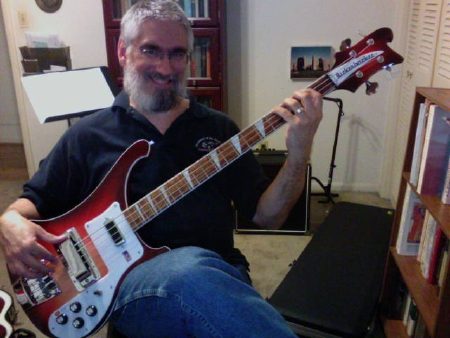
Thanks to a rather lucrative freelancing job I had earlier this year, I’ve upgraded my gear and am now learning with a Rickenbacker bass (I am not worthy to be playing such a wonderful instrument, but when we say “life’s not fair” sometimes that works to our advantage). I’m going to start back on my lessons, and who knows? Maybe some day I’ll be good enough to at least pluck along with a church praise band. Or not. We’ll see. My commitment to the bass is entirely to have fun.
But of course, learning a musical instrument in midlife is about a lot more than just having fun. I’m facing all the demons of insecurity and low self-esteem that prevented me from picking up the bass (or some other instrument) 30 or 40 years ago. Yes, I can say that my parents never encouraged me to play an instrument and without that kind of external support/discipline, I probably wouldn’t have made it very far; nowadays I can be my own “parent” and pull the self-discipline up from within me. I suppose that’s true (although every professional musician I know had the self-discipline at age 13; in fact, usually they got in trouble with their parents because they were more interested in playing the guitar than in doing homework, but I suppose that’s another story). However we slice it, the bottom line is that I’m doing something now, rather awkwardly, that many other folks pull off successfully before they learn how to drive. I suppose there’s some humility in there.
But there’s also all the “I’m not good enough” stuff. “What’s a guy with gray hair and a less than svelte physique doing trying to learn a rock and roll instrument?” that snarky voice whispers within me. “Isn’t this just some weird midlife phase?” “Sell the bass, act your age, and invest the money. It would be a wiser thing to do.” Every time I try to learn a new riff and I make a loud buzzing noise or a string of flat notes, I have to breathe through the temptation to get angry or feel defeated. “I’m doing this for fun,” I keep reminding myself. “This isn’t about becoming a professional musician, or being cool, or proving anything to anybody. It’s just about having fun.”
And I’m discovering that, for me and my Rickenbacker, “having fun” means taking baby steps. By the end of my fourth month of classes, I was just barely beginning to be able to play eighth notes without totally screwing up. Over a year later, that’s still where I am. Baby steps? Hah! I’m still crawling.
The other night on PBS there was footage from the Crossroads festival a few years back, and Jeff Beck performed with an amazing young Australian bassist named Tal Wilkenfeld. Fran and I both were amazed at her playing chops; I looked her up online and discovered she was born in 1986, meaning she was barely 21 during that performance we saw (indeed, we made the apparently common error of thinking she was Jeff Beck’s daughter). Watching her fingers fly over the fretboard, I felt all my “I’m not worthy stuff” flow up like some sort of psychic acid reflux.
But then I remembered that it’s all about fun, and I don’t have to worry about comparing myself to someone less than half my age who had already “made it” in the bass world. After all, I’m not trying to “make it in the bass world.” But, still, the snarky voice mumbles in the background, because part of me is toxically ambitious and feels like anything I do I should be the best at, period — or else I’m just a worthless pile of you-know-what.
Reflecting on these silly but persistent inner dynamics, I had a flash of insight the other morning. Isn’t the practice of contemplation a lot like learning a musical instrument? Perhaps many other people will see this as pretty much a no-brainer, but for me, having never seriously pursued a disciplined study of an instrument before, it came as a revelation.
I can only speak for myself, but I certainly do the same silly things with my meditation practice that I do with my bass playing. I sit to be silent, and I attack myself for how lousy I am at it. I come up with all sorts of excuses to undermine my discipline — and then, my discipline having been undermined, I accuse myself of bad faith. When I play my “eighth notes” of rather short and not-terribly-focused meditation experiences, I judge myself as unworthy because I am not engaged in the kind of consciousness alteration that (I assume) characterizes the practice of a “true” master.
Practice makes perfect. If at first you don’t succeeed, try try again. These may be little maxims that parents use to keep their kids at their daily hour of piano playing, but they also are solid pointers to the reality of contemplative practice. Of course, the kicker here is this: contemplation, like my approach to the bass, is not meant to be anything other than its own reward. Even if we feel like we don’t “succeed” in contemplation, we’ve succeeded anyway. Of course, success is a not-very-useful category by which to describe contemplation, but since we live in a culture that worships the idol of success so pervasively, we (or at least, I) can’t help but see contemplation as something we might or might not succeed at.
So what is success in contemplation: feeling God’s presence? Noticing deeper serenity and calmness throughout the day? Making it through 20 minutes of centering prayer without a single distraction? (yeah, like that is going to happen!)… we can evaluate our contemplative practice any way we want, and if we try to evaluate it, chances are we’ll just stack the deck so that it comes up lacking. Sigh. So we try not to judge ourselves — even our judging self — and we try, try again. We take baby steps. We play eighth notes and we try not to wince when the string buzzes. And somewhere in the midst of it all, we have fun.
Enjoy reading this blog?
Click here to become a patron.













